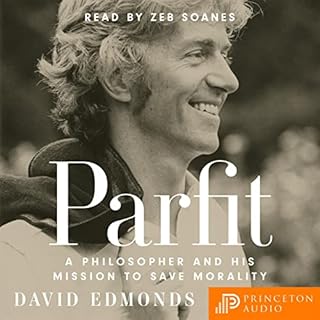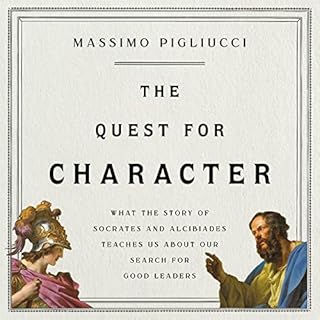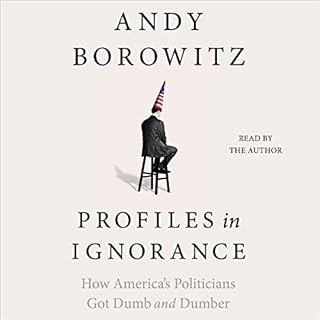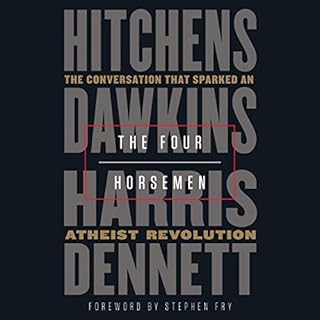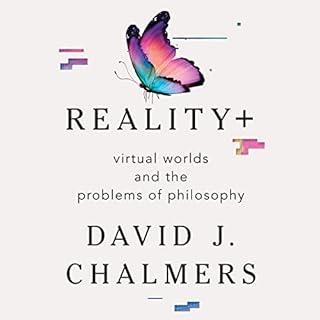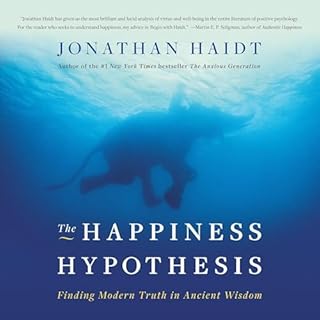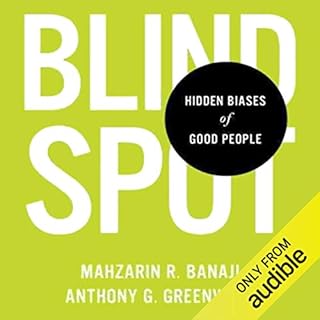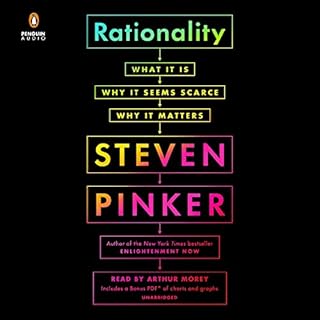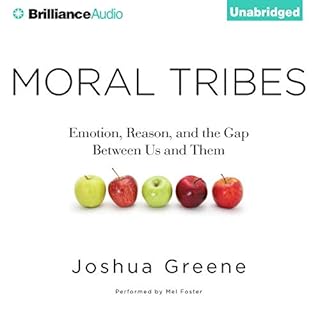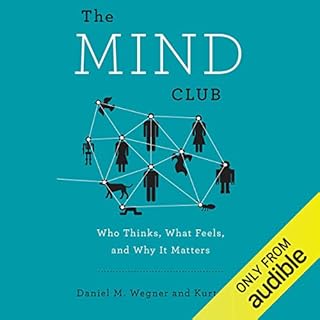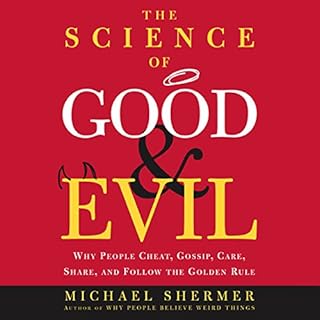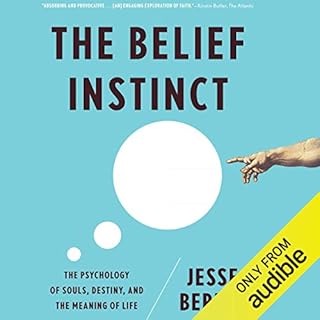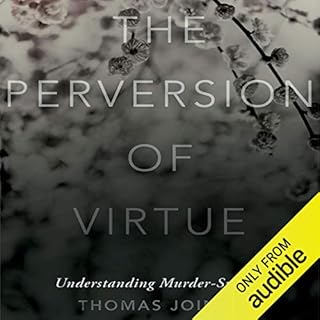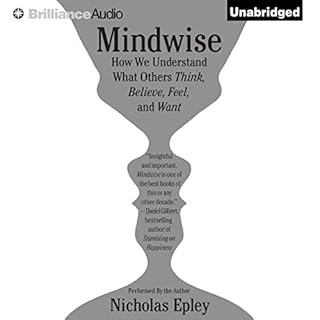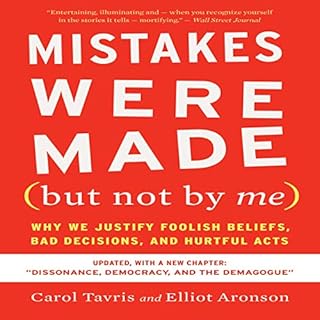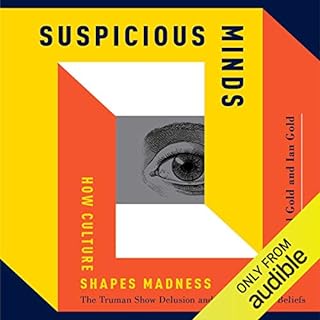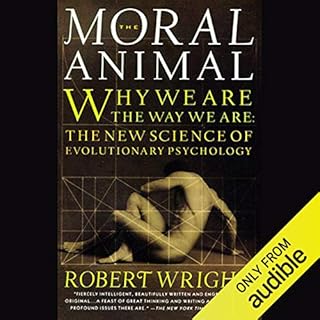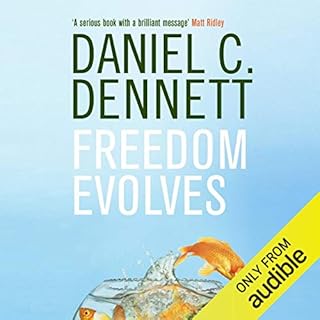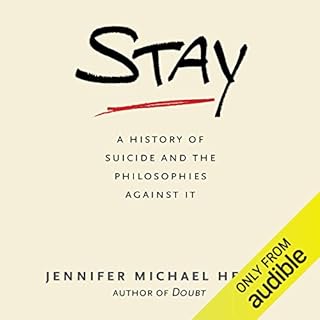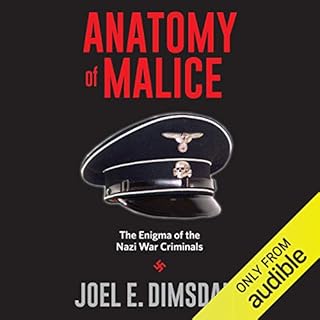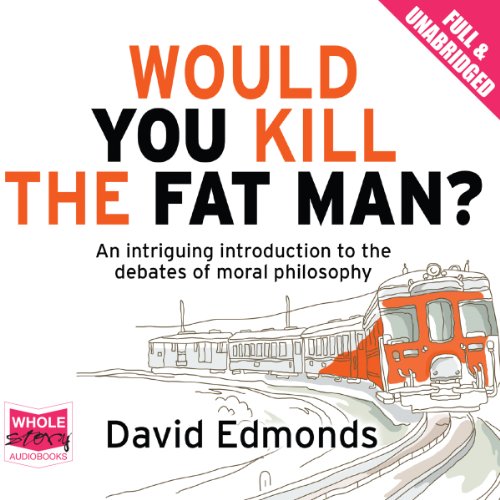
Would You Kill the Fat Man?
Failed to add items
Add to Cart failed.
Add to Wish List failed.
Remove from wishlist failed.
Adding to library failed
Follow podcast failed
Unfollow podcast failed
Buy for $13.57
No default payment method selected.
We are sorry. We are not allowed to sell this product with the selected payment method
-
Narrated by:
-
Gareth Armstrong
-
By:
-
David Edmonds
About this listen
A train is racing toward five men, tied to the track. Unless the train is stopped, it will inevitably kill all five men.
If a fat man is pushed onto the line, although he will die, his body will stop the train, saving five lives. Would you kill the fat man?
As David Edmonds shows, answering the question is far more complex, and important, than it first appears. In fact, how we answer it tells us a great deal about right and wrong.
©2014 David Edmonds (P)2014 W F Howes LtdListeners also enjoyed...
-
Parfit
- A Philosopher and His Mission to Save Morality
- By: David Edmonds
- Narrated by: Zeb Soanes
- Length: 13 hrs and 14 mins
- Unabridged
-
Overall5 out of 5 stars 46
-
Performance5 out of 5 stars 43
-
Story5 out of 5 stars 43
Derek Parfit (1942–2017) is the most famous philosopher most people have never heard of. Widely regarded as one of the greatest moral thinkers of the past hundred years, Parfit was anything but a public intellectual. Yet his ideas have shaped the way philosophers think about things that affect us all: equality, altruism, what we owe to future generations, and even what it means to be a person. In Parfit, David Edmonds presents the first biography of an intriguing, obsessive, and eccentric genius.
-
5 out of 5 stars
-
Loved it
- By Anna Karenina on 07-05-23
By: David Edmonds
-
The Bomber Mafia
- A Dream, a Temptation, and the Longest Night of the Second World War
- By: Malcolm Gladwell
- Narrated by: Malcolm Gladwell
- Length: 5 hrs and 14 mins
- Unabridged
-
Overall4.5 out of 5 stars 9,119
-
Performance5 out of 5 stars 7,832
-
Story4.5 out of 5 stars 7,783
Malcolm Gladwell, author of New York Times best sellers including Talking to Strangers and host of the podcast Revisionist History, uses original interviews, archival footage, and his trademark insight to weave together the stories of a Dutch genius and his homemade computer, a band of brothers in Central Alabama, a British psychopath, and pyromaniacal chemists at Harvard. As listeners hear these stories unfurl, Gladwell examines one of the greatest moral challenges in modern American history.
-
3 out of 5 stars
-
Listen to the same story on his podcast for free
- By Dustin on 04-28-21
By: Malcolm Gladwell
-
What We Owe the Future
- By: William MacAskill
- Narrated by: William MacAskill
- Length: 8 hrs and 55 mins
- Unabridged
-
Overall4.5 out of 5 stars 787
-
Performance4.5 out of 5 stars 679
-
Story4.5 out of 5 stars 671
In What We Owe The Future, philosopher William MacAskill argues for longtermism, that idea that positively influencing the distant future is a key moral priority of our time. It’s not enough to reverse climate change or avert the next pandemic. We must ensure that civilization would rebound if it collapsed, counter the end of moral progress, and prepare for a planet where the smartest beings are digital, not human. If we set humanity’s course right, our grandchildren’s grandchildren will thrive, knowing we did everything to give them a world of justice, hope, and beauty.
-
2 out of 5 stars
-
Empty philosophising
- By Oleksandr on 08-25-22
-
Justice
- By: Michael J. Sandel
- Narrated by: Michael J. Sandel
- Length: 11 hrs and 1 min
- Unabridged
-
Overall4.5 out of 5 stars 1,348
-
Performance4.5 out of 5 stars 999
-
Story4.5 out of 5 stars 990
What are our obligations to others as people in a free society? Should government tax the rich to help the poor? Is the free market fair? Is it sometimes wrong to tell the truth? Do individual rights and the common good conflict? These questions are at the core of our public life today - and at the heart of Justice, in which Michael J. Sandel shows how a surer grasp of philosophy can help us to make sense of politics, morality, and our own convictions as well.
-
5 out of 5 stars
-
A very worthwhile book
- By Amazon Customer on 11-11-09
-
The Quest for Character
- What the Story of Socrates and Alcibiades Teaches Us About Our Search for Good Leaders
- By: Massimo Pigliucci
- Narrated by: Alan Carlson
- Length: 7 hrs and 54 mins
- Unabridged
-
Overall4.5 out of 5 stars 37
-
Performance4.5 out of 5 stars 32
-
Story4.5 out of 5 stars 32
Is good character something that can be taught? In 430 BCE, Socrates set out to teach the vain, power-seeking Athenian statesman Alcibiades how to be a good person—and failed spectacularly. Alcibiades went on to beguile his city into a hopeless war with Syracuse, and all of Athens paid the price. In The Quest for Character, philosophy professor Massimo Pigliucci tells this famous story and asks what we can learn from it.
-
5 out of 5 stars
-
another great work by Massimo
- By Cameron on 11-14-22
-
Profiles in Ignorance
- How America's Politicians Got Dumb and Dumber
- By: Andy Borowitz
- Narrated by: Andy Borowitz
- Length: 8 hrs and 51 mins
- Unabridged
-
Overall5 out of 5 stars 824
-
Performance5 out of 5 stars 726
-
Story5 out of 5 stars 721
The winner of the first-ever National Press Club award for humor, Andy Borowitz has been called a “Swiftian satirist” (The Wall Street Journal) and “one of the country’s finest satirists” (The New York Times). Millions of fans and New Yorker readers enjoy his satirical news column “The Borowitz Report”. Now, in Profiles in Ignorance, he offers a witty, spot-on diagnosis of our country’s political troubles by showing how ignorant leaders are degrading, embarrassing, and endangering our nation.
-
5 out of 5 stars
-
Fascinating, Familiar and Frightening Tales
- By Shoppy McShopperson on 09-28-22
By: Andy Borowitz
-
Parfit
- A Philosopher and His Mission to Save Morality
- By: David Edmonds
- Narrated by: Zeb Soanes
- Length: 13 hrs and 14 mins
- Unabridged
-
Overall5 out of 5 stars 46
-
Performance5 out of 5 stars 43
-
Story5 out of 5 stars 43
Derek Parfit (1942–2017) is the most famous philosopher most people have never heard of. Widely regarded as one of the greatest moral thinkers of the past hundred years, Parfit was anything but a public intellectual. Yet his ideas have shaped the way philosophers think about things that affect us all: equality, altruism, what we owe to future generations, and even what it means to be a person. In Parfit, David Edmonds presents the first biography of an intriguing, obsessive, and eccentric genius.
-
5 out of 5 stars
-
Loved it
- By Anna Karenina on 07-05-23
By: David Edmonds
-
The Bomber Mafia
- A Dream, a Temptation, and the Longest Night of the Second World War
- By: Malcolm Gladwell
- Narrated by: Malcolm Gladwell
- Length: 5 hrs and 14 mins
- Unabridged
-
Overall4.5 out of 5 stars 9,119
-
Performance5 out of 5 stars 7,832
-
Story4.5 out of 5 stars 7,783
Malcolm Gladwell, author of New York Times best sellers including Talking to Strangers and host of the podcast Revisionist History, uses original interviews, archival footage, and his trademark insight to weave together the stories of a Dutch genius and his homemade computer, a band of brothers in Central Alabama, a British psychopath, and pyromaniacal chemists at Harvard. As listeners hear these stories unfurl, Gladwell examines one of the greatest moral challenges in modern American history.
-
3 out of 5 stars
-
Listen to the same story on his podcast for free
- By Dustin on 04-28-21
By: Malcolm Gladwell
-
What We Owe the Future
- By: William MacAskill
- Narrated by: William MacAskill
- Length: 8 hrs and 55 mins
- Unabridged
-
Overall4.5 out of 5 stars 787
-
Performance4.5 out of 5 stars 679
-
Story4.5 out of 5 stars 671
In What We Owe The Future, philosopher William MacAskill argues for longtermism, that idea that positively influencing the distant future is a key moral priority of our time. It’s not enough to reverse climate change or avert the next pandemic. We must ensure that civilization would rebound if it collapsed, counter the end of moral progress, and prepare for a planet where the smartest beings are digital, not human. If we set humanity’s course right, our grandchildren’s grandchildren will thrive, knowing we did everything to give them a world of justice, hope, and beauty.
-
2 out of 5 stars
-
Empty philosophising
- By Oleksandr on 08-25-22
-
Justice
- By: Michael J. Sandel
- Narrated by: Michael J. Sandel
- Length: 11 hrs and 1 min
- Unabridged
-
Overall4.5 out of 5 stars 1,348
-
Performance4.5 out of 5 stars 999
-
Story4.5 out of 5 stars 990
What are our obligations to others as people in a free society? Should government tax the rich to help the poor? Is the free market fair? Is it sometimes wrong to tell the truth? Do individual rights and the common good conflict? These questions are at the core of our public life today - and at the heart of Justice, in which Michael J. Sandel shows how a surer grasp of philosophy can help us to make sense of politics, morality, and our own convictions as well.
-
5 out of 5 stars
-
A very worthwhile book
- By Amazon Customer on 11-11-09
-
The Quest for Character
- What the Story of Socrates and Alcibiades Teaches Us About Our Search for Good Leaders
- By: Massimo Pigliucci
- Narrated by: Alan Carlson
- Length: 7 hrs and 54 mins
- Unabridged
-
Overall4.5 out of 5 stars 37
-
Performance4.5 out of 5 stars 32
-
Story4.5 out of 5 stars 32
Is good character something that can be taught? In 430 BCE, Socrates set out to teach the vain, power-seeking Athenian statesman Alcibiades how to be a good person—and failed spectacularly. Alcibiades went on to beguile his city into a hopeless war with Syracuse, and all of Athens paid the price. In The Quest for Character, philosophy professor Massimo Pigliucci tells this famous story and asks what we can learn from it.
-
5 out of 5 stars
-
another great work by Massimo
- By Cameron on 11-14-22
-
Profiles in Ignorance
- How America's Politicians Got Dumb and Dumber
- By: Andy Borowitz
- Narrated by: Andy Borowitz
- Length: 8 hrs and 51 mins
- Unabridged
-
Overall5 out of 5 stars 824
-
Performance5 out of 5 stars 726
-
Story5 out of 5 stars 721
The winner of the first-ever National Press Club award for humor, Andy Borowitz has been called a “Swiftian satirist” (The Wall Street Journal) and “one of the country’s finest satirists” (The New York Times). Millions of fans and New Yorker readers enjoy his satirical news column “The Borowitz Report”. Now, in Profiles in Ignorance, he offers a witty, spot-on diagnosis of our country’s political troubles by showing how ignorant leaders are degrading, embarrassing, and endangering our nation.
-
5 out of 5 stars
-
Fascinating, Familiar and Frightening Tales
- By Shoppy McShopperson on 09-28-22
By: Andy Borowitz
-
The Righteous Mind
- Why Good People Are Divided by Politics and Religion
- By: Jonathan Haidt
- Narrated by: Jonathan Haidt
- Length: 11 hrs and 1 min
- Unabridged
-
Overall4.5 out of 5 stars 12,713
-
Performance4.5 out of 5 stars 10,996
-
Story4.5 out of 5 stars 10,856
In The Righteous Mind, social psychologist Jonathan Haidt explores the origins of our divisions and points the way forward to mutual understanding. His starting point is moral intuition - the nearly instantaneous perceptions we all have about other people and the things they do. These intuitions feel like self-evident truths, making us righteously certain that those who see things differently are wrong. Haidt shows us how these intuitions differ across cultures, including the cultures of the political left and right.
-
4 out of 5 stars
-
Why Good People Are Divided - Good for whom?
- By K. Cunningham on 09-21-12
By: Jonathan Haidt
-
The Four Horsemen
- The Conversation That Sparked an Atheist Revolution
- By: Christopher Hitchens, Richard Dawkins, Sam Harris, and others
- Narrated by: Richard Dawkins, Daniel C. Dennett, Sam Harris, and others
- Length: 3 hrs and 4 mins
- Unabridged
-
Overall5 out of 5 stars 1,155
-
Performance5 out of 5 stars 978
-
Story5 out of 5 stars 967
In 2007, Christopher Hitchens, Richard Dawkins, Sam Harris, and Daniel Dennett filmed a landmark discussion about modern atheism. The video went viral. Now, the transcript of their conversation is illuminated by new essays from three of the original participants and an introduction by Stephen Fry.
-
4 out of 5 stars
-
Short
- By Cole Brandon Eckhardt on 03-22-19
By: Christopher Hitchens, and others
-
Reality+
- Virtual Worlds and the Problems of Philosophy
- By: David J. Chalmers
- Narrated by: Grant Cartwright
- Length: 17 hrs and 12 mins
- Unabridged
-
Overall4 out of 5 stars 195
-
Performance4.5 out of 5 stars 154
-
Story4 out of 5 stars 153
Virtual reality is genuine reality; that’s the central thesis of Reality+. In a highly original work of “technophilosophy,” David J. Chalmers gives a compelling analysis of our technological future. He argues that virtual worlds are not second-class worlds, and that we can live a meaningful life in virtual reality. We may even be in a virtual world already.
-
3 out of 5 stars
-
A book that could have been an email
- By Peter C. on 04-15-22
-
Being Wrong
- Adventures in the Margin of Error
- By: Kathryn Schulz
- Narrated by: Mia Barron
- Length: 14 hrs and 17 mins
- Unabridged
-
Overall4.5 out of 5 stars 586
-
Performance4.5 out of 5 stars 458
-
Story4.5 out of 5 stars 458
To err is human. Yet most of us go through life assuming (and sometimes insisting) that we are right about nearly everything, from the origins of the universe to how to load the dishwasher. If being wrong is so natural, why are we all so bad at imagining that our beliefs could be mistaken, and why do we react to our errors with surprise, denial, defensiveness, and shame?
-
5 out of 5 stars
-
A good read
- By Mike Kircher on 10-06-10
By: Kathryn Schulz
-
The Happiness Hypothesis
- By: Jonathan Haidt
- Narrated by: Ryan Vincent Anderson
- Length: 10 hrs and 18 mins
- Unabridged
-
Overall4.5 out of 5 stars 6,962
-
Performance4.5 out of 5 stars 5,820
-
Story4.5 out of 5 stars 5,771
Jonathan Haidt skillfully combines two genres-philosophical wisdom and scientific research-delighting the listener with surprising insights. He explains, for example, why we have such difficulty controlling ourselves and sticking to our plans; why no achievement brings lasting happiness, yet a few changes in your life can have profound effects, and why even confirmed atheists experience spiritual elevation.
-
4 out of 5 stars
-
Amazing book, terrible choice in voice.
- By JAMES on 02-05-19
By: Jonathan Haidt
-
The God Delusion
- By: Richard Dawkins
- Narrated by: Richard Dawkins, Lalla Ward
- Length: 13 hrs and 52 mins
- Unabridged
-
Overall4.5 out of 5 stars 13,349
-
Performance4.5 out of 5 stars 9,738
-
Story4.5 out of 5 stars 9,627
Discover magazine recently called Richard Dawkins "Darwin's Rottweiler" for his fierce and effective defense of evolution. Prospect magazine voted him among the top three public intellectuals in the world (along with Umberto Eco and Noam Chomsky). Now Dawkins turns his considerable intellect on religion, denouncing its faulty logic and the suffering it causes.
-
4 out of 5 stars
-
Dangerous Religion
- By Rick Just on 12-21-06
By: Richard Dawkins
-
The Better Angels of Our Nature
- Why Violence Has Declined
- By: Steven Pinker
- Narrated by: Arthur Morey
- Length: 36 hrs and 39 mins
- Unabridged
-
Overall4.5 out of 5 stars 6,357
-
Performance4.5 out of 5 stars 5,508
-
Story4.5 out of 5 stars 5,461
Faced with the ceaseless stream of news about war, crime, and terrorism, one could easily think we live in the most violent age ever seen. Yet as New York Times bestselling author Steven Pinker shows in this startling and engaging new work, just the opposite is true: violence has been diminishing for millennia and we may be living in the most peaceful time in our species's existence.
-
5 out of 5 stars
-
I'd kill for another book this good
- By Eric on 11-11-11
By: Steven Pinker
-
The Undoing Project
- A Friendship That Changed Our Minds
- By: Michael Lewis
- Narrated by: Dennis Boutsikaris
- Length: 10 hrs and 18 mins
- Unabridged
-
Overall4.5 out of 5 stars 13,159
-
Performance4.5 out of 5 stars 11,480
-
Story4.5 out of 5 stars 11,467
Forty years ago Israeli psychologists Daniel Kahneman and Amos Tversky wrote a series of breathtakingly original studies undoing our assumptions about the decision-making process. Their papers showed the ways in which the human mind erred systematically when forced to make judgments about uncertain situations. Their work created the field of behavioral economics, revolutionized Big Data studies, advanced evidence-based medicine, led to a new approach to government regulation, and made Michael Lewis' work possible.
-
4 out of 5 stars
-
Behind the scenes of amazing science
- By Neuron on 10-16-17
By: Michael Lewis
-
Free Will
- By: Sam Harris
- Narrated by: Sam Harris
- Length: 1 hr and 14 mins
- Unabridged
-
Overall4.5 out of 5 stars 5,264
-
Performance4.5 out of 5 stars 4,544
-
Story4.5 out of 5 stars 4,459
A belief in free will touches nearly everything that human beings value. It is difficult to think about law, politics, religion, public policy, intimate relationships, morality—as well as feelings of remorse or personal achievement—without first imagining that every person is the true source of his or her thoughts and actions. And yet the facts tell us that free will is an illusion.
-
5 out of 5 stars
-
Wrong Question
- By Jennifer on 11-15-14
By: Sam Harris
-
The Moral Landscape
- How Science Can Determine Human Values
- By: Sam Harris
- Narrated by: Sam Harris
- Length: 6 hrs and 48 mins
- Unabridged
-
Overall4.5 out of 5 stars 4,474
-
Performance4.5 out of 5 stars 3,644
-
Story4.5 out of 5 stars 3,586
In this explosive new book, Sam Harris tears down the wall between scientific facts and human values, arguing that most people are simply mistaken about the relationship between morality and the rest of human knowledge. Harris urges us to think about morality in terms of human and animal well-being, viewing the experiences of conscious creatures as peaks and valleys on a "moral landscape".
-
5 out of 5 stars
-
Read it
- By Paul on 11-23-10
By: Sam Harris
-
Blindspot
- By: Mahzarin R. Banaji, Anthony G. Greenwald
- Narrated by: Eric Jason Martin
- Length: 7 hrs and 51 mins
- Unabridged
-
Overall4 out of 5 stars 566
-
Performance4 out of 5 stars 461
-
Story4 out of 5 stars 458
I know my own mind. I am able to assess others in a fair and accurate way. These self-perceptions are challenged by leading psychologists Mahzarin R. Banaji and Anthony G. Greenwald as they explore the hidden biases we all carry from a lifetime of exposure to cultural attitudes about age, gender, race, ethnicity, religion, social class, sexuality, disability status, and nationality. Blindspot is the authors’ metaphor for the portion of the mind that houses hidden biases.
-
1 out of 5 stars
-
Difficult to interpret.
- By Ryan Arnold on 12-21-15
By: Mahzarin R. Banaji, and others
-
Rationality
- What It Is, Why It Seems Scarce, Why It Matters
- By: Steven Pinker
- Narrated by: Arthur Morey
- Length: 11 hrs and 19 mins
- Unabridged
-
Overall4.5 out of 5 stars 1,102
-
Performance4.5 out of 5 stars 911
-
Story4.5 out of 5 stars 896
In the 21st century, humanity is reaching new heights of scientific understanding - and at the same time appears to be losing its mind. How can a species that developed vaccines for COVID-19 in less than a year produce so much fake news, medical quackery, and conspiracy theorizing? Pinker rejects the cynical cliché that humans are an irrational species - cavemen out of time saddled with biases, fallacies, and illusions.
-
3 out of 5 stars
-
Steven Pinker's Frozen Worldview from the 90s
- By Ryan Booth on 11-12-21
By: Steven Pinker
Related to this topic
-
Moral Tribes
- Emotion, Reason, and the Gap Between Us and Them
- By: Joshua Greene
- Narrated by: Mel Foster
- Length: 14 hrs and 53 mins
- Unabridged
-
Overall4.5 out of 5 stars 636
-
Performance4.5 out of 5 stars 531
-
Story4 out of 5 stars 528
A pathbreaking neuroscientist reveals how our social instincts turn Me into Us, but turn Us against Them - and what we can do about it. The great dilemma of our shrinking world is simple: never before have those we disagree with been so present in our lives. The more globalization dissolves national borders, the more clearly we see that human beings are deeply divided on moral lines - about everything from tax codes to sexual practices to energy consumption - and that, when we really disagree, our emotions turn positively tribal.
-
3 out of 5 stars
-
Good Science, Bad Philosophy
- By Jacob on 10-27-16
By: Joshua Greene
-
The Mind Club
- Who Thinks, What Feels, and Why It Matters
- By: Daniel M. Wegner, Kurt Gray
- Narrated by: David Marantz
- Length: 9 hrs and 45 mins
- Unabridged
-
Overall4.5 out of 5 stars 759
-
Performance4.5 out of 5 stars 669
-
Story4.5 out of 5 stars 672
Nothing seems more real than the minds of other people. When you consider what your boss is thinking or whether your spouse is happy, you are admitting them into the "mind club". It's easy to assume other humans can think and feel, but what about a cow, a computer, a corporation? What kinds of minds do they have? Daniel M. Wegner and Kurt Gray are award-winning psychologists who have discovered that minds - while incredibly important - are a matter of perception.
-
5 out of 5 stars
-
Who is the self in me? Am I part of something bigger?
- By Philomath on 03-24-16
By: Daniel M. Wegner, and others
-
The Science of Good and Evil
- Why People Cheat, Gossip, Care, Share, and Follow the Golden Rule
- By: Michael Shermer
- Length: 2 hrs and 21 mins
- Abridged
-
Overall4.5 out of 5 stars 95
-
Performance4.5 out of 5 stars 72
-
Story4 out of 5 stars 69
In The Science of Good and Evil, psychologist and science historian Michael Shermer explores how humans evolved from social primates into moral primates, how and why morality motivates the human animal, and how the foundation of moral principles can be built upon empirical evidence. Along the way he explains the implications of scientific findings for fate and free will, the existence of pure good and pure evil, and the development of early moral sentiments among the first humans.
-
5 out of 5 stars
-
Read by author
- By Gregory A. Townsend on 04-16-23
By: Michael Shermer
-
The Belief Instinct
- The Psychology of Souls, Destiny, and the Meaning of Life
- By: Jesse Bering
- Narrated by: Jesse Bering
- Length: 6 hrs and 13 mins
- Unabridged
-
Overall4.5 out of 5 stars 101
-
Performance4.5 out of 5 stars 89
-
Story4.5 out of 5 stars 86
Why is belief so hard to shake? Despite our best attempts to embrace rational thought and reject superstition, we often find ourselves appealing to unseen forces that guide our destiny, wondering who might be watching us as we go about our lives, and imagining what might come after death. In this lively and masterfully argued new book, Jesse Bering unveils the psychological underpinnings of why we believe.
-
5 out of 5 stars
-
engaging and insightful
- By juliagee on 01-02-15
By: Jesse Bering
-
The Perversion of Virtue
- Understanding Murder-Suicide
- By: Thomas Joiner
- Narrated by: Chris Kayser
- Length: 10 hrs and 19 mins
- Unabridged
-
Overall4.5 out of 5 stars 26
-
Performance4.5 out of 5 stars 24
-
Story4.5 out of 5 stars 24
In The Perversion of Virtue, leading suicide researcher Thomas Joiner explores the nature of murder-suicide and offers a unique new theory to explain this nearly unexplainable act: that murder-suicides always involve the wrongheaded invocation of one of four interpersonal virtues: mercy, justice, duty, and glory. The parent who murders his child and then himself seeks to save his child from a fatherless life of hardship; the wife who murders her husband and then herself seeks to right the wrongs he committed against her, and so on.
-
5 out of 5 stars
-
I cannot more highly recommend this book
- By Emily Karp on 05-07-18
By: Thomas Joiner
-
Mindwise
- Why We Misunderstand What Others Think, Believe, Feel, and Want
- By: Nicholas Epley
- Narrated by: Nicholas Epley
- Length: 6 hrs and 24 mins
- Unabridged
-
Overall4.5 out of 5 stars 385
-
Performance4.5 out of 5 stars 329
-
Story4 out of 5 stars 322
You are a mind reader, born with an extraordinary ability to understand what others think, feel, believe, want, and know. It's a sixth sense you use every day, in every personal and professional relationship you have. At its best, this ability allows you to achieve the most important goal in almost any life: connecting, deeply and intimately and honestly, to other human beings. At its worst, it is a source of misunderstanding and unnecessary conflict, leading to damaged relationships and broken dreams. How good are you at knowing the minds of others?
-
2 out of 5 stars
-
Finally gave up - no real point
- By Thomas on 05-12-14
By: Nicholas Epley
-
Moral Tribes
- Emotion, Reason, and the Gap Between Us and Them
- By: Joshua Greene
- Narrated by: Mel Foster
- Length: 14 hrs and 53 mins
- Unabridged
-
Overall4.5 out of 5 stars 636
-
Performance4.5 out of 5 stars 531
-
Story4 out of 5 stars 528
A pathbreaking neuroscientist reveals how our social instincts turn Me into Us, but turn Us against Them - and what we can do about it. The great dilemma of our shrinking world is simple: never before have those we disagree with been so present in our lives. The more globalization dissolves national borders, the more clearly we see that human beings are deeply divided on moral lines - about everything from tax codes to sexual practices to energy consumption - and that, when we really disagree, our emotions turn positively tribal.
-
3 out of 5 stars
-
Good Science, Bad Philosophy
- By Jacob on 10-27-16
By: Joshua Greene
-
The Mind Club
- Who Thinks, What Feels, and Why It Matters
- By: Daniel M. Wegner, Kurt Gray
- Narrated by: David Marantz
- Length: 9 hrs and 45 mins
- Unabridged
-
Overall4.5 out of 5 stars 759
-
Performance4.5 out of 5 stars 669
-
Story4.5 out of 5 stars 672
Nothing seems more real than the minds of other people. When you consider what your boss is thinking or whether your spouse is happy, you are admitting them into the "mind club". It's easy to assume other humans can think and feel, but what about a cow, a computer, a corporation? What kinds of minds do they have? Daniel M. Wegner and Kurt Gray are award-winning psychologists who have discovered that minds - while incredibly important - are a matter of perception.
-
5 out of 5 stars
-
Who is the self in me? Am I part of something bigger?
- By Philomath on 03-24-16
By: Daniel M. Wegner, and others
-
The Science of Good and Evil
- Why People Cheat, Gossip, Care, Share, and Follow the Golden Rule
- By: Michael Shermer
- Length: 2 hrs and 21 mins
- Abridged
-
Overall4.5 out of 5 stars 95
-
Performance4.5 out of 5 stars 72
-
Story4 out of 5 stars 69
In The Science of Good and Evil, psychologist and science historian Michael Shermer explores how humans evolved from social primates into moral primates, how and why morality motivates the human animal, and how the foundation of moral principles can be built upon empirical evidence. Along the way he explains the implications of scientific findings for fate and free will, the existence of pure good and pure evil, and the development of early moral sentiments among the first humans.
-
5 out of 5 stars
-
Read by author
- By Gregory A. Townsend on 04-16-23
By: Michael Shermer
-
The Belief Instinct
- The Psychology of Souls, Destiny, and the Meaning of Life
- By: Jesse Bering
- Narrated by: Jesse Bering
- Length: 6 hrs and 13 mins
- Unabridged
-
Overall4.5 out of 5 stars 101
-
Performance4.5 out of 5 stars 89
-
Story4.5 out of 5 stars 86
Why is belief so hard to shake? Despite our best attempts to embrace rational thought and reject superstition, we often find ourselves appealing to unseen forces that guide our destiny, wondering who might be watching us as we go about our lives, and imagining what might come after death. In this lively and masterfully argued new book, Jesse Bering unveils the psychological underpinnings of why we believe.
-
5 out of 5 stars
-
engaging and insightful
- By juliagee on 01-02-15
By: Jesse Bering
-
The Perversion of Virtue
- Understanding Murder-Suicide
- By: Thomas Joiner
- Narrated by: Chris Kayser
- Length: 10 hrs and 19 mins
- Unabridged
-
Overall4.5 out of 5 stars 26
-
Performance4.5 out of 5 stars 24
-
Story4.5 out of 5 stars 24
In The Perversion of Virtue, leading suicide researcher Thomas Joiner explores the nature of murder-suicide and offers a unique new theory to explain this nearly unexplainable act: that murder-suicides always involve the wrongheaded invocation of one of four interpersonal virtues: mercy, justice, duty, and glory. The parent who murders his child and then himself seeks to save his child from a fatherless life of hardship; the wife who murders her husband and then herself seeks to right the wrongs he committed against her, and so on.
-
5 out of 5 stars
-
I cannot more highly recommend this book
- By Emily Karp on 05-07-18
By: Thomas Joiner
-
Mindwise
- Why We Misunderstand What Others Think, Believe, Feel, and Want
- By: Nicholas Epley
- Narrated by: Nicholas Epley
- Length: 6 hrs and 24 mins
- Unabridged
-
Overall4.5 out of 5 stars 385
-
Performance4.5 out of 5 stars 329
-
Story4 out of 5 stars 322
You are a mind reader, born with an extraordinary ability to understand what others think, feel, believe, want, and know. It's a sixth sense you use every day, in every personal and professional relationship you have. At its best, this ability allows you to achieve the most important goal in almost any life: connecting, deeply and intimately and honestly, to other human beings. At its worst, it is a source of misunderstanding and unnecessary conflict, leading to damaged relationships and broken dreams. How good are you at knowing the minds of others?
-
2 out of 5 stars
-
Finally gave up - no real point
- By Thomas on 05-12-14
By: Nicholas Epley
-
The Better Angels of Our Nature
- Why Violence Has Declined
- By: Steven Pinker
- Narrated by: Arthur Morey
- Length: 36 hrs and 39 mins
- Unabridged
-
Overall4.5 out of 5 stars 6,357
-
Performance4.5 out of 5 stars 5,508
-
Story4.5 out of 5 stars 5,461
Faced with the ceaseless stream of news about war, crime, and terrorism, one could easily think we live in the most violent age ever seen. Yet as New York Times bestselling author Steven Pinker shows in this startling and engaging new work, just the opposite is true: violence has been diminishing for millennia and we may be living in the most peaceful time in our species's existence.
-
5 out of 5 stars
-
I'd kill for another book this good
- By Eric on 11-11-11
By: Steven Pinker
-
Mistakes Were Made (But Not by Me): Third Edition
- Why We Justify Foolish Beliefs, Bad Decisions, and Hurtful Acts
- By: Carol Tavris, Elliot Aronson
- Narrated by: Carol Tavris, Elliot Aronson
- Length: 12 hrs and 11 mins
- Unabridged
-
Overall4.5 out of 5 stars 177
-
Performance4.5 out of 5 stars 162
-
Story4.5 out of 5 stars 162
Renowned social psychologists Carol Tavris and Elliot Aronson take a compelling look into how the brain is wired for self-justification. When we make mistakes, we must calm the cognitive dissonance that jars our feelings of self-worth. And so we create fictions that absolve us of responsibility, restoring our belief that we are smart, moral, and right - a belief that often keeps us on a course that is dumb, immoral, and wrong. Backed by years of research and delivered in energetic prose, Mistakes Were Made (But Not by Me) offers a fascinating explanation of self-deception.
-
2 out of 5 stars
-
If you're a liberal hater - this book's for you
- By MRN on 11-13-20
By: Carol Tavris, and others
-
Blindspot
- By: Mahzarin R. Banaji, Anthony G. Greenwald
- Narrated by: Eric Jason Martin
- Length: 7 hrs and 51 mins
- Unabridged
-
Overall4 out of 5 stars 566
-
Performance4 out of 5 stars 461
-
Story4 out of 5 stars 458
I know my own mind. I am able to assess others in a fair and accurate way. These self-perceptions are challenged by leading psychologists Mahzarin R. Banaji and Anthony G. Greenwald as they explore the hidden biases we all carry from a lifetime of exposure to cultural attitudes about age, gender, race, ethnicity, religion, social class, sexuality, disability status, and nationality. Blindspot is the authors’ metaphor for the portion of the mind that houses hidden biases.
-
1 out of 5 stars
-
Difficult to interpret.
- By Ryan Arnold on 12-21-15
By: Mahzarin R. Banaji, and others
-
Breaking the Spell
- Religion as a Natural Phenomenon
- By: Daniel C. Dennett
- Narrated by: Dennis Holland
- Length: 12 hrs and 19 mins
- Unabridged
-
Overall4.5 out of 5 stars 759
-
Performance4.5 out of 5 stars 662
-
Story4.5 out of 5 stars 649
For all the thousands of books that have been written about religion, few until this one have attempted to examine it scientifically: to ask why - and how - it has shaped so many lives so strongly. Is religion a product of blind evolutionary instinct or rational choice? Is it truly the best way to live a moral life? Ranging through biology, history, and psychology, Daniel C. Dennett charts religion’s evolution from “wild” folk belief to “domesticated” dogma.
-
5 out of 5 stars
-
Great Reader Actually Enhances A Great Book!
- By Don Caliente on 07-14-14
-
Sex, Murder, and the Meaning of Life
- A Psychologist Investigates How Evolution, Cognition, and Complexity Are Revolutionizing Our View of Human Nature
- By: Douglas T. Kenrick
- Narrated by: Fred Stella
- Length: 7 hrs and 31 mins
- Unabridged
-
Overall4 out of 5 stars 153
-
Performance4 out of 5 stars 110
-
Story4 out of 5 stars 106
Between what can be learned from evolutionary psychology and cognitive science a picture emerges. In Sex, Murder, and the Meaning of Life, social psychologist Douglas Kenrick fuses these two fields to create a coherent story of human nature. In his analysis, many ingrained, apparently irrational behaviors—one-night stands, prejudice, conspicuous consumption, even art and religious devotion—are quite explicable and (when desired) avoidable.
-
1 out of 5 stars
-
Rather dated and self-aggrandizing
- By Laurie Frick on 07-21-11
-
Suspicious Minds
- How Culture Shapes Madness
- By: Joel Gold, Ian Gold
- Narrated by: Joel Gold, Ian Gold
- Length: 9 hrs and 51 mins
- Unabridged
-
Overall4 out of 5 stars 110
-
Performance4 out of 5 stars 101
-
Story4 out of 5 stars 102
Mr. A. was admitted to Dr. Joel Gold’s inpatient unit at Bellevue Hospital in 2002. He was, he said, being filmed constantly, and his life was being broadcast around the world "like The Truman Show" - the 1998 film depicting a man who is unknowingly living out his life as the star of a popular soap opera. Over the next few years, Gold saw a number of patients suffering from what he and his brother, Dr. Ian Gold, began calling the "Truman Show Delusion," launching them on a quest to understand the nature of this particular phenomenon and the nature of madness itself.
-
3 out of 5 stars
-
Intriguing
- By L. K. on 04-18-16
By: Joel Gold, and others
-
Down Girl
- The Logic of Misogyny
- By: Kate Manne
- Narrated by: Lauren Fortgang
- Length: 10 hrs and 17 mins
- Unabridged
-
Overall4.5 out of 5 stars 378
-
Performance4.5 out of 5 stars 313
-
Story4.5 out of 5 stars 310
Misogyny is a hot topic, yet it's often misunderstood. What is misogyny, exactly? Who deserves to be called a misogynist? How does misogyny contrast with sexism, and why is it prone to persist - or increase - even when sexist gender roles are waning? This book is an exploration of misogyny in public life and politics by the moral philosopher Kate Manne. It argues that misogyny should not be understood primarily in terms of the hatred or hostility some men feel toward all or most women. Rather, it's primarily about controlling, policing, punishing, and exiling the "bad" women.
-
5 out of 5 stars
-
Five Star Book w/bad Narration
- By Cherrybomb on 02-08-19
By: Kate Manne
-
The Moral Animal
- Why We Are the Way We Are: The New Science of Evolutionary Psychology
- By: Robert Wright
- Narrated by: Greg Thornton
- Length: 16 hrs and 30 mins
- Unabridged
-
Overall4.5 out of 5 stars 1,881
-
Performance4 out of 5 stars 1,529
-
Story4.5 out of 5 stars 1,527
Are men literally born to cheat? Does monogamy actually serve women's interests? These are among the questions that have made The Moral Animal one of the most provocative science books in recent years. Wright unveils the genetic strategies behind everything from our sexual preferences to our office politics - as well as their implications for our moral codes and public policies.
-
5 out of 5 stars
-
Ridiculously Insightful
- By Liron on 10-25-10
By: Robert Wright
-
Freedom Evolves
- By: Daniel C. Dennett
- Narrated by: Robert Blumenfeld
- Length: 11 hrs and 21 mins
- Unabridged
-
Overall4.5 out of 5 stars 135
-
Performance4 out of 5 stars 113
-
Story4.5 out of 5 stars 112
Can there be freedom and free will in a deterministic world? Renowned philosopher Daniel Dennett emphatically answers "yes!" Using an array of provocative formulations, Dennett sets out to show how we alone among the animals have evolved minds that give us free will and morality. Weaving a richly detailed narrative, Dennett explains in a series of strikingly original arguments - drawing upon evolutionary biology, cognitive neuroscience, economics, and philosophy - that far from being an enemy of traditional explorations of freedom, morality, and meaning, the evolutionary perspective can be an indispensable ally.
-
5 out of 5 stars
-
I knew I was going to like this book
- By Gary on 05-30-14
-
Stay
- A History of Suicide and the Philosophies Against It
- By: Jennifer Michael Hecht
- Narrated by: Jennifer Michael Hecht
- Length: 8 hrs and 8 mins
- Unabridged
-
Overall4 out of 5 stars 147
-
Performance4 out of 5 stars 129
-
Story4 out of 5 stars 130
Worldwide, more people die by suicide than by murder, and many more are left behind to grieve. Despite distressing statistics that show suicide rates rising, the subject, long a taboo, is infrequently talked about. In this sweeping intellectual and cultural history, poet and historian Jennifer Michael Hecht channels her grief for two friends lost to suicide into a search for history’s most persuasive arguments against the irretrievable act, arguments she hopes to bring back into public consciousness.
-
3 out of 5 stars
-
Informative but oddly dispassionate
- By Scott on 01-07-14
-
Anatomy of Malice
- The Enigma of the Nazi War Criminals
- By: Joel E. Dimsdale
- Narrated by: J. Paul Guimont
- Length: 7 hrs and 14 mins
- Unabridged
-
Overall4 out of 5 stars 49
-
Performance4.5 out of 5 stars 43
-
Story4 out of 5 stars 42
When the ashes had settled after World War II and the Allies convened an international war crimes trial in Nuremberg, a psychiatrist, Douglas Kelley, and a psychologist, Gustave Gilbert, tried to fathom the psychology of the Nazi leaders using extensive psychiatric interviews, IQ tests, and Rorschach inkblot tests. Never before or since has there been such a detailed study of governmental leaders who orchestrated mass killings.
-
5 out of 5 stars
-
History Lover
- By Tamara on 03-02-17
By: Joel E. Dimsdale
-
The Blank Slate
- The Modern Denial of Human Nature
- By: Steven Pinker
- Narrated by: Victor Bevine
- Length: 22 hrs and 40 mins
- Unabridged
-
Overall4.5 out of 5 stars 2,965
-
Performance4.5 out of 5 stars 2,295
-
Story4.5 out of 5 stars 2,259
In The Blank Slate, Steven Pinker, one of the world's leading experts on language and the mind, explores the idea of human nature and its moral, emotional, and political colorings. With characteristic wit, lucidity, and insight, Pinker argues that the dogma that the mind has no innate traits, denies our common humanity and our individual preferences, replaces objective analyses of social problems with feel-good slogans, and distorts our understanding of politics, violence, parenting, and the arts.
-
1 out of 5 stars
-
Don't bother. Outdated science & poor logic...
- By ejf211 on 03-31-10
By: Steven Pinker
What listeners say about Would You Kill the Fat Man?
Average customer ratingsReviews - Please select the tabs below to change the source of reviews.
-
Overall4 out of 5 stars
-
Performance5 out of 5 stars
-
Story4 out of 5 stars
- Cameron Preston Kruger
- 11-19-20
Entertaining Philosophy
Crisp writing and an excellent reading performance make this Audible book a delight to listen to.
Something went wrong. Please try again in a few minutes.
You voted on this review!
You reported this review!
-
Overall5 out of 5 stars
-
Performance5 out of 5 stars
-
Story5 out of 5 stars
- smarmer
- 09-10-14
Excellent intro to Meta-ethics and philosophy
Any additional comments?
I teach a course on ethics to third year medical students. I majored in philosophy as an undergrad before becoming a physician. I try to get them to search for the basic principles on which they base their decisions, especially with regard to such controversial topics as physician assisted suicide, abortion, complex triage choices, and allocation of medical resources. I have used the "Trolley Case" for many years to force them to think at a deeper level.
This book is a splendid introduction to the "Trolley Case" and to the whole question of duty ethics versus utilitarian ethics, with fascinating excursions into the concepts of virtue, the role of neuroscience, and whether morality is learned or innate.
The narrator has just the right amount of whimsey in his voice to capture the humor of the author. Highly recommended to anyone interested in this important topic.
Something went wrong. Please try again in a few minutes.
You voted on this review!
You reported this review!
4 people found this helpful
-
Overall5 out of 5 stars
-
Performance5 out of 5 stars
-
Story5 out of 5 stars
- Douglas
- 01-25-14
Wonderfully Rendered Book...
on the complexity of moral decisions and how rationality--and to a surprising degree--emotion play roles in our everyday ethics. I teach a class based in Theories Of Morality, and my classes discuss such questions on a daily basis, including the one that gives this book its title. Since Kohlberg and Gilligan began their search for a testable rubric for morality (both included gender as a factor in moral decisions), ethics scientists have struggled to define what a "moral act" is and how exactly we arrive at the decisions we make when ethics are at stake. Edmonds does a fine job here of furthering the debate and clarifying many of its ongoing issues. This book would go very well with John Haidt's The Happiness Hypothesis (the title has a lot to do with ethics and how we decide, so the title is a bit misleading) & his second book The Righteous Mind--I highly recommend both be take with Would You Kill The Fat Man.
Something went wrong. Please try again in a few minutes.
You voted on this review!
You reported this review!
7 people found this helpful
-
Overall4 out of 5 stars
-
Performance4 out of 5 stars
-
Story3 out of 5 stars
- Julie Stanley
- 04-23-14
Stick with it.
What did you love best about Would You Kill the Fat Man??
I liked exploring the idea of morality and how varied that can be, even within one culture. Though, I don't feel the book came to any concrete conclusions, nor should it. Morality is both social and personally dictated and hard to predict.
Would you recommend Would You Kill the Fat Man? to your friends? Why or why not?
While I enjoyed Would You Kill The Fat Man, I wouldn't necessarily recommend it to others unless, I knew they had a tolerance and understanding of academia. There were times when I felt all the theories were getting just too ridiculous and too convoluted and almost felt like turning it off. But, I stuck with it and, it does end up pulling together a lot of the various aspects and theories.
What about Gareth Armstrong’s performance did you like?
Gareth's performance was expressive and interesting, highlighting the humour.
Any additional comments?
About half to, three quaters through, it was all starting to seem very nonsensical. Like wading through a quagmire. However, if you stick with it, it does get better again.
Something went wrong. Please try again in a few minutes.
You voted on this review!
You reported this review!
4 people found this helpful



